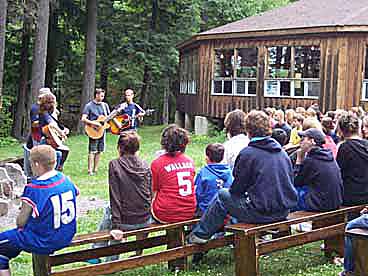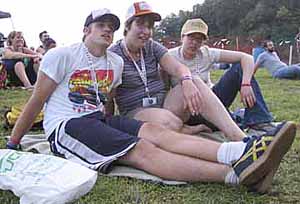Canadian Mennonite
Volume 10, No. 18
September 18, 2006

What makes a camp Mennonite and Christian?
Waterloo, Ont.
 |
Across Mennonite Church Eastern Canada it was a busy summer for camping ministries. The four ‘nature’ camps are scattered across south-central Ontario: Silver Lake Mennonite Camp between Owen Sound and Lake Huron; Hidden Acres Mennonite Camp near New Hamburg; and Willowgrove with Fraser Lake Camp near Bancroft (250 kilometres north of Toronto), and Glenbrook Day Camp at Stouffville, northeast of Toronto.
Ben Janzen, director at Silver Lake, and Campbell Nisbet, director at Hidden Acres, had a remarkably similar list of what makes their camps Mennonite. They commented that their camps were founded by a Mennonite community and that they teach Mennonite theology as they foster spirituality and faith, build community among the staff, focus on service, teach peace and encourage it in relationships at all times.
Eric Musselman, director at Fraser Lake, and Jessica Reesor, peace instructor at Glenbrook, also list teaching peace as important parts of the spirituality at their camps. Both camps are part of Willowgrove, which includes an elementary school, and openly show their Christian roots and values; they include their membership in the Mennonite Camping Association on their websites.
All of the camps have roots in one of the founding conferences of MC Eastern Canada and to some extent continue to show their roots.
At Silver Lake there has been a renewed focus on spirituality over the past number of years and the position of spiritual life coordinator, held by Melanie Vandersluis, is relatively new. Her job, as one of the senior staff, is to aid the counsellors in their spiritual lives and in their work with campers.
Spirituality at Silver Lake—from the United Mennonite Conference—takes place at the fire circle at morning watch as well as in teaching peace and service to the staff and campers.
At Hidden Acres (from the Western Ont. or Amish Mennonite Conference) spirituality takes place at a worship service that happens each day before lunch and at evening prayers. All the camps report active meal prayer-songs as part of the pervasive spirituality.
Musselman, from Fraser Lake (from Mennonite Conference of Ontario and Quebec), notes, “We try to incorporate faith into the daily fabric of camp life—so that it isn’t so much about ‘religious’ time and ‘non-religious’ time, but that it’s just part of the daily routine.” Even so, there are many “religious” events throughout the day at Fraser Lake, including morning watch, chapels, evening devotions and campfires. Musselman adds, “All of our spiritual activities are done with the hope that campers and staff develop an awareness of God around them, and to give them a safe place to question and seek and explore without judgment or condemnation.”
Glenbrook, with a younger camper demographic and shorter day, finds it more difficult to instill Christian faith and values. The peace program, run by Reesor, includes a day on “peace heroes and Jesus as the ultimate peace hero,” and her sessions, taught from a Christian perspective, place an equal emphasis on peace at interpersonal, local and global levels. Sessions include hands-on demonstrations, art, visuals, drama and music.
Young adults preparing for baptism often note that camp was a formative experience in their spiritual lives. Some also report that they feel most “spiritual” when at camp, and often need a summer refresher to renew their faith.
Pastors sometimes wonder how to help campers and staff bring their “camp” faith into the city or town. How to move from Hidden Acres as “a natural place to meet God” to “walking with God on the pavement of life”?
Is camp spirituality affecting the staff and campers at home?
Vandersluis reported that she had grown into an understanding of faith at camp. “My family didn’t go to church often,” she said. “It was at camp where I developed a relationship with God.”
She is now attending a congregation regularly. The discipline of journalling—writing letters to God—is something she learned at camp and now uses to strengthen her relationship with God through the year.
Jodi Poole, a counsellor at Hidden Acres, has taken the discipline of a modified consciousness exam home with her. Each evening counsellors at Hidden Acres ask their campers for two good things and one bad thing from the day and then pray with them. Poole has continued to do this for herself each evening at home in Wellesley, Ont.
Janzen told the story of three staff who decided to room together for the winter. It didn’t take long for the relationships to sour and serious differences to occur. But dipping into their training at camp, and using Matthew 18:15 (when you have something against a brother or sister, go and talk to your sister or brother), they worked at their differences in a Christian and edifying way, resolving them and saving the relationships.
An important outcome of spirituality at camp for both Vandersluis and Poole is a growing sense of self-worth. They both said that growing closer to God has given them a greater sense of their own gifts and that they can use these for God. They noted feeling comfortable with themselves and growing in patience with self, other staff and the campers.
Both Janzen and Gwen Dell’Anno, who began as new director at Silver Lake in early September, note the need to revisit their camp’s roots. Although the camps were founded by Mennonites, these roots need to be renewed from time to time.
Another question the directors raised was that of outside resources. “Do we bring someone in from the outside to [assist] staff, taking the time to bring them up to steam, or do we do things ourselves?” was how Janzen put it.
Dell’Anno wondered if failing to bring in outside resources can lead to insularity.
Silver Lake brought in Ilene Bergen, pastor at Steinmann Mennonite Church in Baden, Ont., to teach staff about Mennonites.
Could something similar be done for resource staff like Vandersluis in their spiritual work?
As part of the Counsellors in Leadership Training (CILT) at Silver Lake, Janzen has been using Corinne Ware’s “Discover Your Spiritual Type” to help staff learn their own spirituality style.
What makes a camp Mennonite and Christian?
The Ontario camps are making sure that the camp leaders are trained and rooted in Christian spirituality in a Mennonite style, focussing on peace at the centre of the gospel.
Nidus Festival brings together Christian denominations
Kitchener, Ont.
 |
Should your taste in spirituality run to Orthodox icons or to drum-led, rapping prayer circles, or anywhere in between, Nidus (Latin for “nest”) was the place for you. This first-ever ecumenical weekend, held at Bingemans Event Centre in Kitchener from August 4 to 6 and sponsored by the Canadian Council of Churches, provided a space for people of all generations to express faith, celebrate the arts and seek justice.
Wandering through the presentations and displays, and listening to the many concerts and speakers, it seemed that except for conservative groups like the Amish, the whole broad spectrum of Christianity in Canada was represented. Mennonite-related organizations included Christian Peacemaker Teams (CPT), Geez magazine (see sidebar), and Mennonite Central Committee.
Mennonite young adults who attended appeared enthusiastic for many aspects of the festival; they pored over the full schedule, trying to fit in as much as possible.
Internal combustion engines
|
For some, this experience in ecumenism was rather new. For others, it was part of a growing interest and passion. Dana Honderich of Wilmot Mennonite Church, Baden, Ont., was encouraged by conversations she heard. In other ecumenical dialogue she had seen a “no denominations kick” that hasn’t fit well with her, because she felt downplaying differences isn’t always the most genuine or helpful way to learn from each other. Honderich witnessed an inter-denominational panel responding to Bruxy Cavey’s words on the “end of religion,” where, instead of “yes, but…,” the comments to each other began with “yes, and this is how we talk about this question in our tradition.”
Jim Loney’s presence was a major draw to a Saturday afternoon workshop for CPT. Loney was one of four CPT hostages held in Iraq for nearly four months. Together with Scott Albrecht, he presented something of CPT’s work around the world.
When asked if CPT is “successful,” Loney described places like Al-Tawani in Palestine, where CPT’s influence has helped the oppressed. Using himself as another example, he spoke of how his Iraqi captors had asked him, “If the U.S. came into your country and oppressed you, wouldn’t you pick up weapons to fight for freedom?”
“No,” he had replied, “Issa Salem, Jesus’ peace” would stop him from doing any violence. He also claimed that his captivity in Iraq has led to a new solidarity among Christian churches uniting against violence.
An open-table communion on Sunday morning was led by a minister of the United Church of Canada. She explored Jesus’ transfiguration during her homily, commenting on Peter’s declaration: “It is good for us to be here.” A “good place,” she suggested, is one where God’s revelation is experienced.
After the disciples came down from the mountain of transfiguration, they hardly knew what to do with what they had seen. Perhaps Nidus was a bit like that experience. Was it all just a fun weekend, or did it call the churches to come together to help discern where God is at work in the world?
Author Brian McLaren shared on Sunday morning that the church is awake when it becomes compassionate, but it is dangerous when it becomes passionate for justice. Perhaps Nidus has made the church just a little more dangerous.
Plans are underway for Nidus 2007.